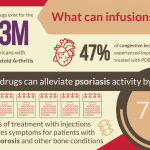All About Rheumatoid Arthritis and Infusion Therapy
Rheumatoid arthritis, or RA, is an inflammatory autoimmune disease, meaning the patient’s immune system attacks healthy cells in the body by mistake. This causes inflammation and painful swelling in the affected parts of the body. RA attacks the joints, often many joints at once, mainly affecting the hands, wrists and knees.
RA is a chronic disorder and can be debilitating for many people. In fact, nearly 1.5 million people in the U.S. have rheumatoid arthritis. Fortunately, within the last few years, there has been a shift in strategy in RA treatment. The availability of new classes of medications has dramatically improved patient outcomes. Rheumatoid arthritis treatment now aims to achieve the lowest possible level of arthritis disease activity and possible remission. This minimizes joint damage and enhances physical function and quality of life.
What is rheumatoid arthritis?
When the body’s immune system mistakenly attacks the joints, inflammation causes the tissue lining the inside of the joints, or the synovium, to thicken. This results in pain and swelling in and around the joints. When the inflammation continues, it damages cartilage, which is the elastic tissue that covers the bones. Over time, the amount of cartilage decreases, and the joint spacing between bones can become smaller. Joints then become unstable, loose, painful and may lose mobility. Joint damage cannot be reversed and can often occur early on in the diagnosis of RA.
RA is a systemic disease, meaning it can affect the entire body. It can damage other tissues and cause problems in organs such as the lungs, heart and eyes.
What are the symptoms of rheumatoid arthritis?
RA symptoms can include:
- Fever
- Fatigue
- Weakness
- Weight loss
- Pain in more than one joint
- Stiffness in more than one joint
- The same symptoms on both sides of the body
- Swelling and tenderness in more than one joint
Who gets rheumatoid arthritis?
The exact cause of RA is unknown, but there are certain risk factors. RA commonly begins between the ages of 30 and 60 in women and later in life in men. There are nearly three times as many women as men who suffer from the condition. While the majority of people with the disease have no family history of rheumatoid arthritis, there is evidence that autoimmune conditions, in general, can be hereditary. Therefore, having a family member with RA may increase an individual’s chance of getting it.
How is rheumatoid arthritis treated?
Treatment for RA has improved considerably over the past 30 years and includes new approaches through intravenous infusions. Current treatments offer excellent relief of symptoms and allow patients to function at or near regular activity. While there is no cure for rheumatoid arthritis, many patients can have no signs of active disease or go in remission.
Because joint damage can occur quickly with RA, swift diagnosis and treatment prevents joints from having lasting or permanent damage. For most patients, a single treatment will not provide remission. The majority of patients with RA have to change their medication at least once during their lifetime.
RA treatment typically includes the use of medications to slow the disease and prevent joint deformity. These treatments are called disease-modifying anti-rheumatic drugs or DMARDs. This type of drug is delivered orally or intravenously.
Common DMARDs include:
- Methotrexate
- Leflunomide
- Hydroxychloroquine
- Sulfasalazine
Biologic response modifiers are a type of DMARD. These drugs target the part of the immune system response that leads to inflammation and joint damage. Biologic response modifiers are taken intravenously.
The second line of treatment for RA includes nonsteroidal anti-inflammatory drugs, NSAID pain relievers or low-dose corticosteroids to lower pain and swelling.
In addition to medications, patient education and learning how to cope with RA is vital to a successful treatment plan. Many patients learn self-management strategies to reduce pain and allow them to participate in activities that are important to them.
Infusions to treat rheumatoid arthritis
Personalized Hematology-Oncology of Wake Forest treats patients with RA daily at our certified infusion center. Our experienced team of experts works closely with your doctor to determine proper dosage and treatment schedule. Contact us to learn more about our treatment options.






